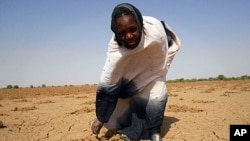Early indicators suggest a widespread food crisis is coming to Africa's Sahel region, while some aid organizations say it has already arrived in the most vulnerable areas.
It is harvest season in the semi-arid strip separating Saharan and sub-Saharan Africa known as the Sahel, but low rainfall and a lack of food reserves threaten food insecurity for tens of millions throughout the region. The majority of those most at risk are in Mali, Mauritania and Niger, which are already experiencing food insufficiency and drastic increases in the prices of cereals grown in the region.
The Sahel is naturally vulnerable to low rainfalls and poor harvests, but they are becoming more frequent and local populations cannot recover fast enough. This food crisis comes on the heels of one in 2010, which has hastened negative coping strategies, according to Thomas Yanga, regional director of the World Food Program.
“We have witnessed, already in certain areas, movements of young male populations towards cities or across borders," Yanga stated. "We have also been informed about families pulling their children out of schools, which is a sign of the gravity of the situation which, for them, is already in a crisis situation."
It is still early on and the effects of the crisis can be limited, according to Eric Hazard, Oxfam regional economic justice manager. With the relief efforts in the Horn of Africa and the global financial crisis, he acknowledges that funds are scarce, but says that is all the more reason to act quickly.
Hazard says that if they act fast, it will cost the international community less in the long run.
He describes a three-fold rapid response plan that includes making the international community aware of the crisis, responding with aid from a variety of sources, and finally directing that aid to the neediest populations in cooperation with local governments.
Hazard says that they can add a fourth measure to make sure the market functions well in the region with external support. He says if states respond as they did during the crises of 2005 and 2008 by closing the borders, the prices will become much higher than they are at the moment.
Oxfam says this crisis has the potential to be worse than that of 2010, which was mainly a problem of access to food because of its prohibitive cost. The coming crisis threatens both food accessibility and availability.
Africa's Sahel Region Braces for Oncoming Food Crisis
- By Nick Loomis




